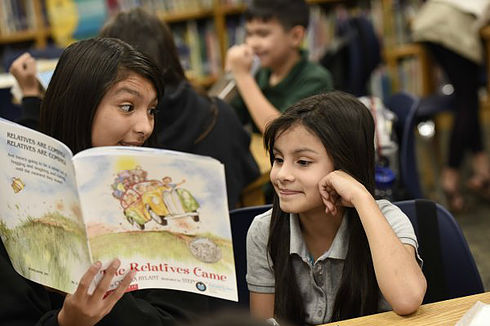
There’s always more to learn. These five simple words carry an entire philosophy of thought within them.
When I was a young ‘bot, I went through a phase where I thought I knew it all. In my defense, I figured I’d been programmed to maximum capacity and was already as smart as they come.
Thankfully, it didn’t take long for me to realize that no one is ever done growing — not even a robot.
This is why we foster a growth mindset at Read Better Be Better, both in the classroom and with our team members and volunteers.
Carol Dweck, author of “Mindset: The New Psychology of Success,” explains the thought process behind a growth mindset:
“In a growth mindset, people believe that their most basic abilities can be developed through dedication and hard work — brains and talent are just the starting point. This view creates a love of learning and a resilience that is essential for great accomplishment.”
Be excellent, be kind, and never stop learning — that’s the core of any good human (or robot) if you ask me.
Our Job Is Never Done
A growth mindset is at the forefront of the Read Better Be Better curriculum. Even if a child’s comprehension levels are better than ever before, we believe they can build on them and rise even higher.
Maybe that means reading two books during curriculum rather than one, or working on using complete sentences on sticky notes rather than a few words.
Basically, we feel our job is never done. When students are excelling, we show them how to build on those strengths and how to use them in new ways to achieve more. Our students are encouraged during every RBBB session and shown that the sky is (not) the limit.
A strength-based curriculum is incredibly effective for RBBB participants, but it’s effectively used in our organization too — including in the way we manage our staff.
Better Than Yesterday

We evaluate our site leaders, and all of our staff, based on a growth mindset — and that approach drives our decisions.
For example, if an RBBB classroom has an 82% average attendance rate, we look at how that outstanding rate was achieved — and how we can get it even higher next semester.
It’s about finding team member strengths, building on them, and always asking how we can be better than we were yesterday. (Yes, even if yesterday was incredibly awesome.)
It’s not tiring or discouraging to think this way — it’s empowering to resist the idea that we’ve done all we can do or achieved all we can achieve.
As our CEO and founder, Sophie Etchart, said, “No child deserves the acceptance of mediocrity as a goal, so Read Better Be Better will always remain committed to the highest standard of achievement for our staff and students. This approach is committed to organizational memory in our values: Be Excellent (Be the best that you can be) and Be Kind (Use your words and deeds to please). Our commitment to a growth mindset is even in our name! The “Be Better” in Read Better Be Better isn’t an outcome or a goal, it is a call to action.”
None of us were programmed to hit a certain level and be done. A growth-mindset approach with our students instills a lifelong love of learning, and enables our organization to grow without limits — and that’s exactly how you define success in my book.
Dr. Dave signing off!
